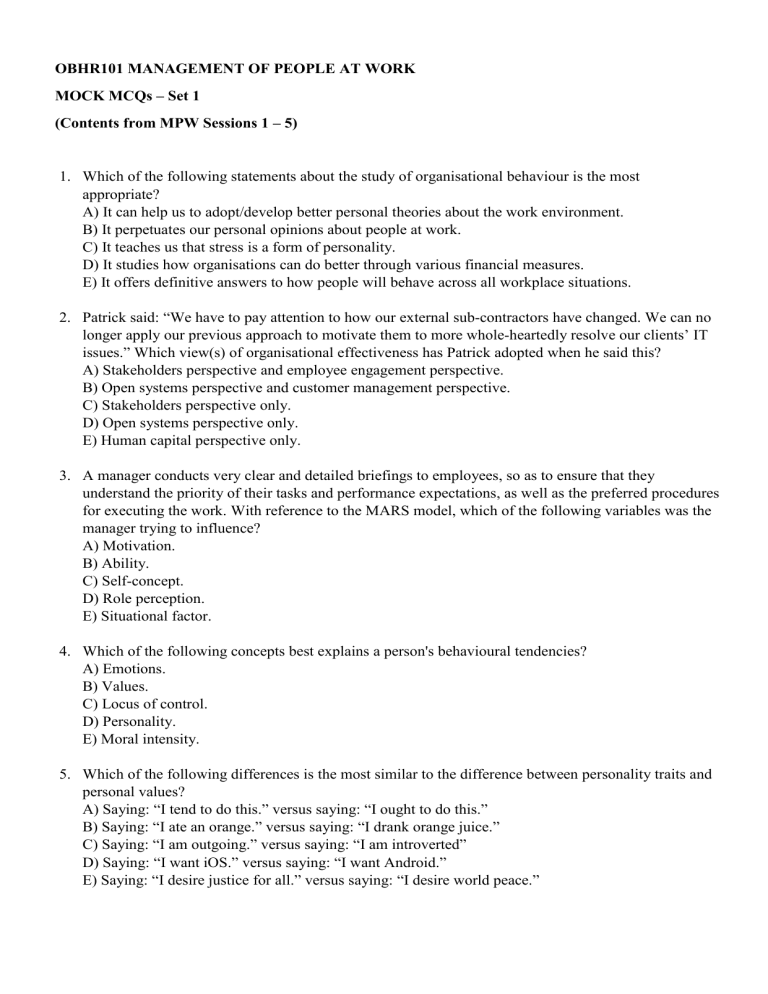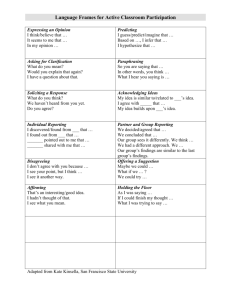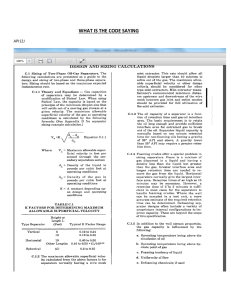
OBHR101 MANAGEMENT OF PEOPLE AT WORK MOCK MCQs – Set 1 (Contents from MPW Sessions 1 – 5) 1. Which of the following statements about the study of organisational behaviour is the most appropriate? A) It can help us to adopt/develop better personal theories about the work environment. B) It perpetuates our personal opinions about people at work. C) It teaches us that stress is a form of personality. D) It studies how organisations can do better through various financial measures. E) It offers definitive answers to how people will behave across all workplace situations. 2. Patrick said: “We have to pay attention to how our external sub-contractors have changed. We can no longer apply our previous approach to motivate them to more whole-heartedly resolve our clients’ IT issues.” Which view(s) of organisational effectiveness has Patrick adopted when he said this? A) Stakeholders perspective and employee engagement perspective. B) Open systems perspective and customer management perspective. C) Stakeholders perspective only. D) Open systems perspective only. E) Human capital perspective only. 3. A manager conducts very clear and detailed briefings to employees, so as to ensure that they understand the priority of their tasks and performance expectations, as well as the preferred procedures for executing the work. With reference to the MARS model, which of the following variables was the manager trying to influence? A) Motivation. B) Ability. C) Self-concept. D) Role perception. E) Situational factor. 4. Which of the following concepts best explains a person's behavioural tendencies? A) Emotions. B) Values. C) Locus of control. D) Personality. E) Moral intensity. 5. Which of the following differences is the most similar to the difference between personality traits and personal values? A) Saying: “I tend to do this.” versus saying: “I ought to do this.” B) Saying: “I ate an orange.” versus saying: “I drank orange juice.” C) Saying: “I am outgoing.” versus saying: “I am introverted” D) Saying: “I want iOS.” versus saying: “I want Android.” E) Saying: “I desire justice for all.” versus saying: “I desire world peace.” 6. When people ______________, they are motivated to hear the truth about their existing self-concept, even if the truth hurts. A) have self-efficacy B) have self-esteem C) have self-verification D) have self-enhancement E) have self-serving bias 7. ____________ is the process of filtering information received by our senses, so as to make sense of it. A) Personal identification B) Social learning C) Projection D) Selective attention E) Stereotyping 8. Which process below involves deciding whether an observed behaviour is caused mainly by the person or by the environment? A) Attribution B) Stereotyping C) Social identification D) Selective attention E) Self-identification 9. Emotions will have a greater influence on our perceptions, attitudes, decisions, and behavior than cognition because _____________________________. A) our core affect significantly influences our assessed feelings B) cognitive processes take lesser time to complete C) we are much more conscious of our core affect than our cognition D) negative emotions are more memorable E) our cognition is much more likely to result in negative behaviors 10. Which of the following reflects an immediate effect of our emotion? A) We produce the correct answer to a complicated math problem by working through the formulas. B) We avoid a particular stock although all the market data suggest that it will be a good investment. C) We reason an argument together with a colleague. D) We form a refreshing perspective about a theory after studying it carefully. E) We are motivated to buy a new toy after considering its educational and entertainment value.



